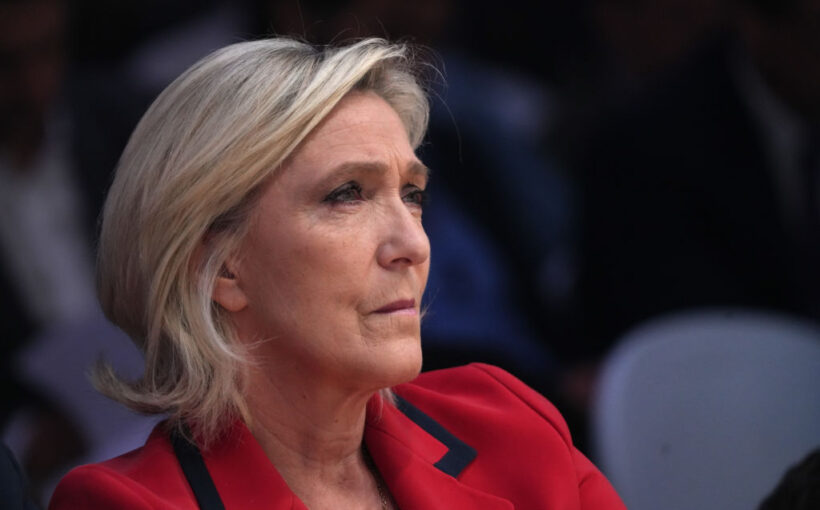PARIS — The chances of an outright victory for the far right in the dramatic French election fell on Tuesday, as centrist and left-wing candidates reluctantly banded together to try to stop Marine Le Pen’s National Rally from taking power for the first time.
At least 200 candidates from both the left-wing alliance and President Emmanuel Macron’s centrist coalition pulled out of the contest ahead of a crucial deadline, in order to unite behind those remaining contenders with the best chance of beating Le Pen’s nationalists, according to estimates from AFP and Le Monde.
Their decisions could determine the outcome of the second round vote on Sunday — and whether France will have a far-right government for the first time in the modern republic’s history.
Tactical withdrawals have divided the presidential camp since the first round, with political heavyweights refusing to toe the line after both Macron and his Prime Minister Gabriel Attal called for a large number of pullouts.
The French electoral system usually does not produce such a complicated picture but Macron’s shock decision to dissolve parliament for a snap vote after losing the EU election to the far right last month has thrown the country’s politics into chaos.
Voters are choosing lawmakers for the French National Assembly’s 577 electoral districts, with 289 seats needed for an absolute majority.
In the second round vote last time there was an election, in 2022, only a handful of districts offered voters a choice of three or more candidates. It was almost always a runoff involving the top two candidates from the first round of voting.
But this time, there are more than 300 constituencies where at least three candidates qualified for the second round runoff, which is taking place on July 7. They usually include one from the far right, one from the left alliance, and one from Macron’s centrist bloc.
That led to frantic discussions behind the scenes among candidates and party officials over whether to drop out and unite the anti-Le Pen vote. They had until 6 p.m. CEST on Tuesday to decide. Many have now chosen to drop out.
So far, 130 candidates from the left-wing New Popular Front (out of 446 who qualified for the second round) and 82 candidates from Macron’s camp (out of 319 who qualified) withdrew from the race, according to estimates by Le Monde. Official figures aren’t available until the data is centralized by France’s Interior Ministry.
The wave of withdrawals means there will now be fewer than 100 districts with three candidates standing in the second round.
The first round of voting on Sunday put Le Pen’s far-right National Rally party in the lead, ahead of the left-wing alliance, with Macron’s centrist coalition lagging behind in third place.
On Sunday night, the de facto leader of the left-wing alliance, Jean-Luc Mélenchon, called on third place finishers from his camp to pull out of local races to stop the National Rally.
Attal sent a similar message to his camp. “In such circumstances, France deserves that we not hesitate,” Attal said on Sunday evening, calling on third place finishers to withdraw when standing could “have the National Rally elected.”
“Grotesque”
But Macron’s camp struggled to stick to the official line. Key figures refused to rally behind far-left candidates whose platform includes massive public spending in an already deeply indebted country.
For some centrists, the left-wing France Unbowed party and its leader Mélenchon pose an equal or even greater danger than Le Pen. Macron himself has spent much of this campaign slamming the policies of the New Popular Front alliance as “grotesque” and destructive for France.
Opponents have slammed the far left, warning that their spending policies would lead France to bankruptcy. The pro-Macron camp has also zeroed-in on France Unbowed for its hard-line opposition to Israel’s war in Gaza, which has led to accusations of antisemitism.
The far right, meanwhile, is often accused of being unprepared for government and incoherent on economic policy, while pushing divisive measures on immigration.
Economy and Finance Minister Bruno Le Maire, who is not running for reelection, said he didn’t support voting for France Unbowed, even when facing a runoff with a National Rally candidate.
Others, like outgoing Minister of Local Authorities and Rural Affairs Dominique Faure, followed the government’s instructions, but made clear that they disagreed. “Maintaining my candidacy was for me the best solution to fight the extremes,” Faure wrote in a note on Tuesday, announcing her withdrawal after intense pressure from the French president and the prime minister.


